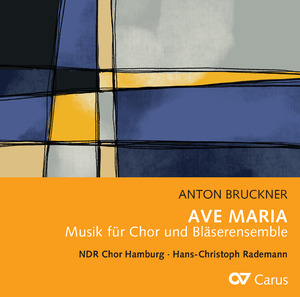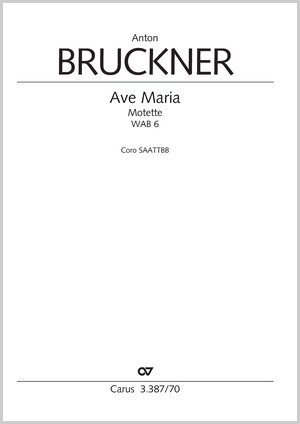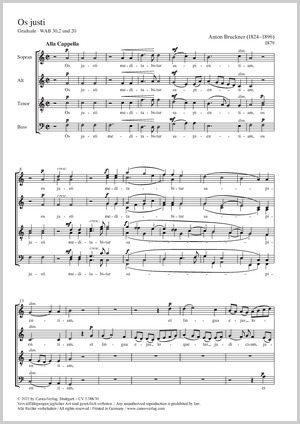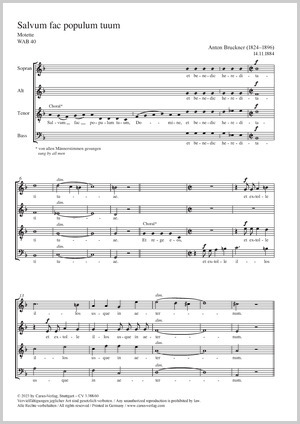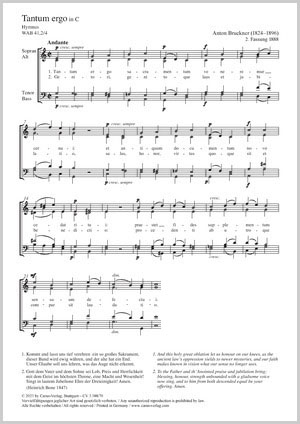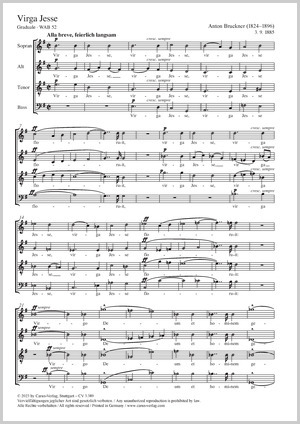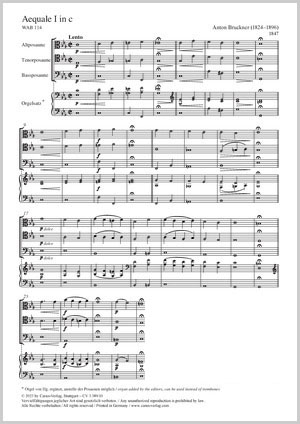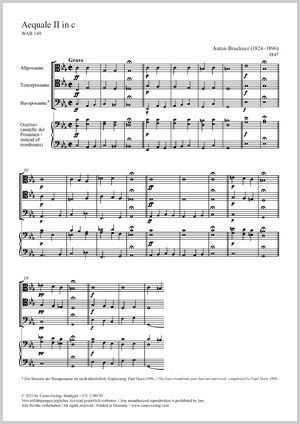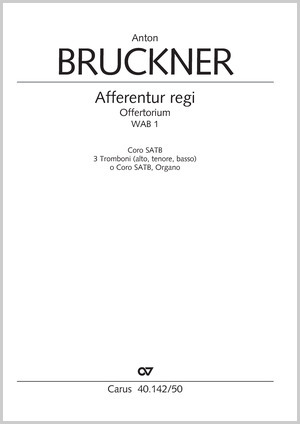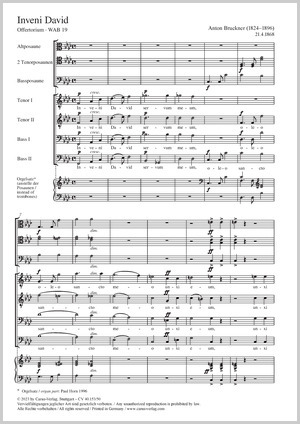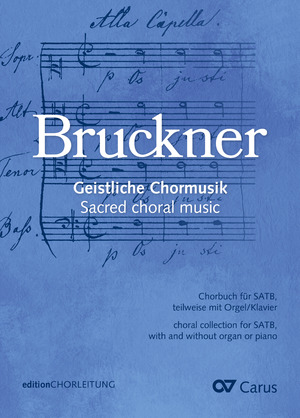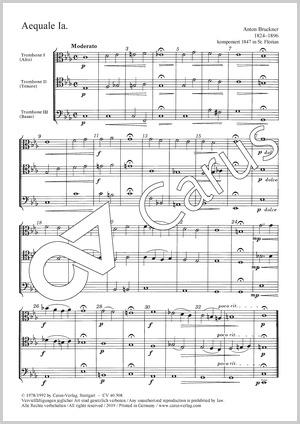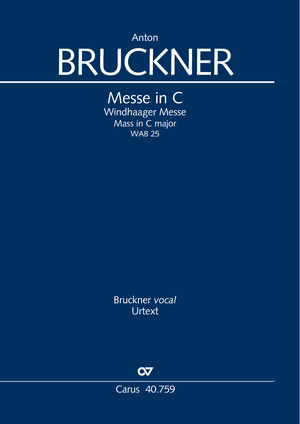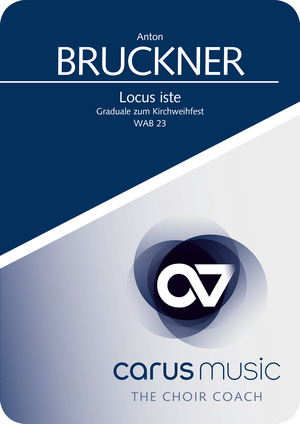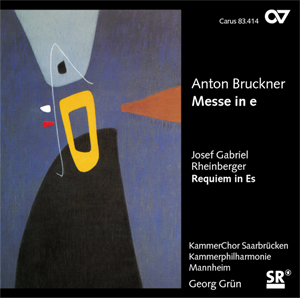Ave Maria
Music for choir and wind ensemble
The NDR Chor Hamburg (North German Radio Choir) under conductor Hans-Christoph Rademann presents a wide-ranging selection of sacred pieces for choir and brass ensemble by Anton Bruckner. The pieces encompass an entire half-century of the composer’s work, allowing the listener to trace the creative development of this deeply religious man.
Purchase
Additional product information
Contents
-
Composer
Anton Bruckner
| 1824-1896Anton Bruckner wurde 1824 in Ansfelden (Österreich) geboren und hatte kein sonderlich einfaches Leben. Der österreichische Komponist stammte aus einfachen, ländlichen Verhältnissen und wurde ein Leben lang von Selbstzweifeln geplagt. Nach dem Tod seines Vaters wurde er im Alter von 13 Jahren als Sängerknabe im Stift Sankt Florian aufgenommen. Nach mehreren Jahren als Schulgehilfe und einem autodidaktischem Orgel- und Klavierstudium arbeitete er zunächst als Organist in Sankt Florian. 1855 wurde er als Domorganist in Linz eingesetzt. Nach einer Einführung in Musiktheorie und Instrumentation durch Simon Sechter und Otto Kitzler, entdeckte Bruckner Richard Wagner als künstlerisches Vorbild, den er zeit seines Lebens bewunderte und auch mehrfach in Bayreuth besuchte.
1868 wurde Anton Bruckner Professor für Generalbass, Kontrapunkt und Orgel am Konservatorium in Wien, zehn Jahre später Hoforganist. 1891 bekam er schließlich einen Ehrendoktor der Wiener Universität. Er galt als wichtiger Orgelvirtuose seiner Epoche, seine kompositorische Anerkennung ließ jedoch auf sich warten. Erst die zwischen 1881 und 1883 entstandene Symphonie Nr.7 in E-Dur mit dem unter dem Eindruck von Wagners Tod entstandenen berühmten Adagio brachte die erhoffte Anerkennung, auch wenn er sie angesichts seiner Tendenz zur Skepsis und Selbstkritik nicht wahrhaben wollte.
Anton Bruckner war ein Einzelgänger, der sich keiner Schule oder Lehrmeinung anschließen wollte. Er schrieb sowohl geistliche als auch weltliche Werke in all ihren Facetten. Neben zahlreichen Motetten komponierte Bruckner drei Messen, die Missa Solemnis b-Moll (1854) und das beim Carus-Verlag erhältliche Te Deum (1881–84; CV 27.190/00). Als Symphoniker schrieb er von 1863 an insgesamt neun Symphonien und viele symphonische Studien, wobei er dazu neigte, fertige Fassungen mehrfach zu überarbeiten. Bruckners Orchesterwerke galten lange als unspielbar, waren aber lediglich für die Tonsprache ihrer Zeit ungewöhnlich kühne, die Traditionen von Beethoven über Wagner bis zur Volksmusik vereinende Klangmonumente an der Grenze von Spätromantik und Moderne. Personal details
-
Preface writer
Jens Schünemeyer
-
Ensemble
NDR Chor Hamburg
Ever since the NDR Choir came into existence in 1946, it has been committed not only to the classical and romantic repertoire but also to contemporary music, which had been banned for a considerable period prior to the choir’s establishment. As a result, the preparation and performance of Schönberg’s unfinished opera Moses und Aron was the focus of worldwide attention in the post-war years. Especially under the direction of Helmut Franz, Max Thurn’s successor, a-cappella literature became a special trade- mark of the choir, a tradition maintained by subsequent conductors such as Roland Bader, Horst Neumann, Robin Gritton and Hans-Christoph Rademann. The choir has also enjoyed the stimulus of working with notable guest conductors such as Eric Ericson, Marcus Creed, Michael Gläser and Rupert Huber. Since the 2008/09 season, Philipp Ahmann has been choral director of the NDR Choir. Among the highpoints of recent years have been performances of Handel’s Israel in Egypt, the Ligeti Requiem and Schönberg’s Gurrelieder. Of the choir’s many CD recordings, the a-cappella works by Max Reger (dir. by H.-Chr. Rademann), which received the 2005 “Prize of the German Record Critics,” deserves special mention. Plans for the 2009/2010 season include Haydn’s The Creation under Martin Haselböck and a concert performance of Bizet’s opera Carmen as well as the choir’s own subscription series under the direction of Philipp Ahmann. Personal details
-
Conductor
Hans-Christoph Rademann
| 1965Conductor Hans-Christoph Rademann is an immensely versatile artist with a broad repertoire who devotes himself with equal passion and expertise both to the performance and rediscovery of early music and to the first performances and cultivation of Contemporary Music. Born in Dresden and raised in the Erzgebirge mountains, he was influenced at an early age by the great Central German kantorial and musical tradition. He was a student at the traditional Kreuzgymnasium, a member of the famous Kreuzchor, and studied choral and orchestral conducting at the Carl Maria von Weber University of Music in Dresden. During his studies, he founded the Dresdner Kammerchor and formed it into a top international choir which is still under his direction today. Since 2013, Hans-Christoph Rademann has been the academy director of the International Bach Academy Stuttgart. He regularly collaborates with leading choirs and ensembles of the international music scene. From 1999 to 2004 he was chief conductor of the NDR Choir and from 2007 to 2015 chief conductor of the RIAS Chamber Choir. Guest conducting engagements have led and continue to lead him to the Nederlandse Bachvereniging, the Collegium Vocale Gent, the Akademie für Alte Musik, the Freiburger Barockorchester, the Deutsche Radiophilharmonie Saarbrücken Kaiserslautern, the Sinfonieorchester Basel, the Orchestre Philharmonique de Luxembourg, among others. Hans-Christoph Rademann has been awarded prizes and honors for his artistic work, including the Johann Walter Plaque of the Saxon Music Council (2014), the Saxon Constitutional Medal (2008), the Sponsorship Prize as well as the Art Prize of the state capital Dresden (1994 and 2014 respectively). He received the Preis der Deutschen Schallplattenkritik several times for his numerous CD recordings (most recently in 2016), as well as the Grand Prix du Disque (2002), the Diapason d’Or (2006 & 2011), the CHOC de l’année 2011 and the Best Baroque Vocal Award 2014. In 2016 he was awarded the European Church Music Prize of the city of Schwäbisch Gmünd. His exemplary interpretation and recording of the complete works of Heinrich Schütz with the Dresdner Kammerchor in the Stuttgart Carus-Verlag, which was completed in 2019, was awarded the newly endowed Heinrich Schütz Prize as well as the OPUS KLASSIK 2020 in the same year. Hans-Christoph Rademann is professor of choral conducting at the Carl Maria von Weber University of Music in Dresden. He is also artistic director of the Musikfest Erzgebirge, ambassador of the Erzgebirge and patron of the Christian Hospice Service Dresden. Personal details
-
Soloist - horn
Gerhard Schröder
-
Soloist - organ
Eberhard Lauer
-
Soloist - trombone
Gerhard Poppe
-
Soloist - trombone
Herbert Schneider
| 1920
-
Soloist - trombone
Walter Preu
-
Soloist - trombone
Eckart Wiewinner
Frequent questions about this work
 There are no questions and answers available so far or you were unable to find an answer to your specific question about this work? Then click here and send your specific questions to our Customer Services!
There are no questions and answers available so far or you were unable to find an answer to your specific question about this work? Then click here and send your specific questions to our Customer Services!


